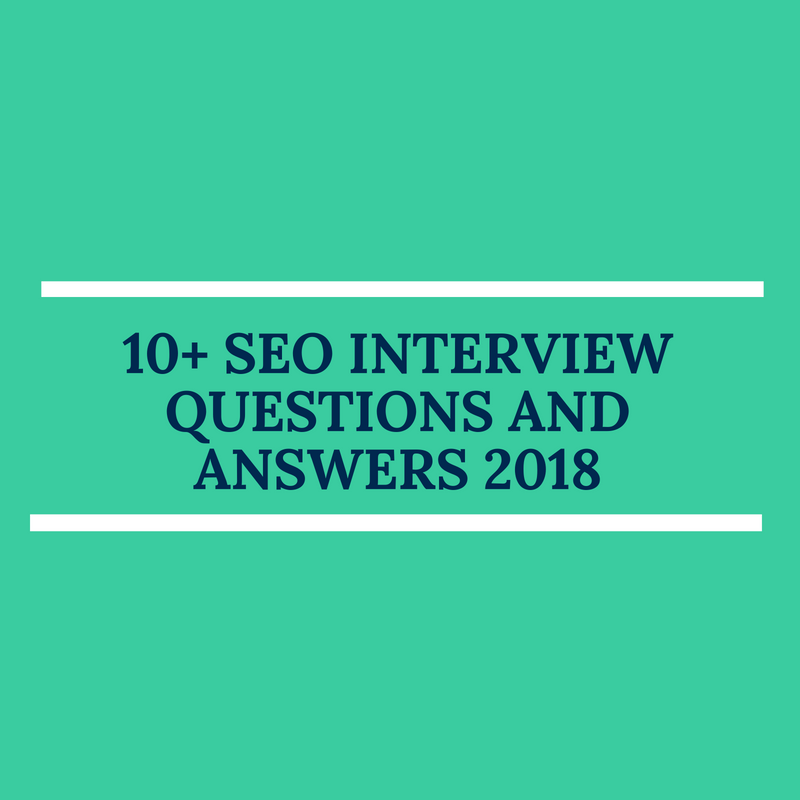SEO is an acronym for Search Engine Optimization. It is the profile to optimize the user searches on various search engines like Google, Bing, Yahoo, etc. As the world is going digital, one can select SEO as a good career option.
In this article, I am going to discuss 10+ SEO interview questions and answers:
1. What is SEO?
This is the first question which you will face in every interview for SEO. SEO deals with the ranking of various websites, products, and other content as per the user searches on different search engines.
2. What is the importance of SEO?
SEO is an important tool in the world of digital marketing. The content with the best SEO score ranks on the first page (within top 10 search results) on a search engine. The top-ranked websites will get more traffic from the internet by user clicks. Hence, results in good earning.
3. What is a Search Engine?
A search engine is a software system that is used when a user enters keywords or key phrases into a search engine and receives a list of Web content results in the form of websites, images, videos or other online data.
4. What is Snippet?
A snippet is a brief description of a product, which users see as a summary just below the searched links on the search engine. A structured snippet helps in increasing the traffic of a website.
5. What are Backlinks?
Backlinks are also called as the incoming links. These are the links that point to your website coming from other website or resources.
6. What are outbound links?
Outbound links are links that redirect you to elsewhere. Outbound links are those links that are link start from your site and direct to an external site. These all links are going to direct you to another specific webpage.
7. What is keyword density?
Keyword density is the percentage of how many times a keyword is used in an article. An ideal keyword density should be to 4% for every article.
8. How do you separate Keywords in a URL?
By using hyphens.
9. What is Blackhat SEO?
The SEO techniques that violate SEO guidelines fall under black hat SEO.
10. What is White Hat SEO?
The SEO techniques that follow SEO guidelines and focus more on human audience fall under White Hat SEO.
11. What is Google Analytics?
Google Analytics is a world’s most popular free Web Analytics tool Offered by Google that tracks the Traffic of your website and helps you to measure how your company online marketing & Presence is working on SE, Social Media, etc
12. What is On-Page SEO?
The technique used to rank a website higher on the internet refers to On-Page SEO. It includes content and HTML source code optimization.
13. What is Off-Page SEO?
The techniques used to promote the content on the internet on different platforms refer to Off-Page SEO. These platforms include Facebook, Tumblr, Reddit, etc.
14. What is Keyword Stemming?
Keyword stemming is nothing but the process of finding a new keyword on the basis of root keyword from the search query. In order to create a new keyword, we can add some prefix, suffix, or pluralization to a keyword.
15. How many types of Meta Tags are there in SEO and what are their characters limits?
There are mainly four types of Meta tags in SEO,
- Title Tag with 55-65 Characters
- Meta Description Tag with 300 Characters
- Meta Keywords Tag
- Meta Robots
16. What is the meaning of Competitive Analysis?
Competitive analysis does the comparison, between the website I am optimizing, and the website that is ranked highly in search results.
17. Can you mention the difference between SEO and SEM?
SEM (Search Engine Marketing), it is used for the promotion of website through paid advertising by increasing their visibility in Search Engine Result Page (SERP) in the Ads section. While SEO is optimizing the site to increase the organic ranking of a site.
18. What is Crawling?
Crawling or web crawling refers to an automated process through which search engines filtrate web pages for proper indexing.
As crawlers like Google Bots also go through other linked pages on websites, companies build sitemaps for better accessibility and navigation.
19. What is Canonical URL?
Canonical URLs relate to the concept of selecting the best URL for the web pages that the visitors want to see. Also, known as canonical tags, these URLs help in content syndication when multiple versions of the same page become available over the Internet. Thus, it is used to resolve issues related to content duplication.
For example, most people would consider these the same URLs:
– www.digitalvalueadd.com
– digitalvalueadd.com/
– www.digitalvalueadd.com/index.html
– digitalvalueadd.com/home.asp
But technically all of these URLs are different.
20. What is Robots.txt?
Robots.txt is useful for preventing the indexation of the parts of any online content that website owners do not want to display.
If you want to block all search engine robots from crawling your website, just put the following code:
User-agent: *
Disallow: /
If you want to block Google from crawling your website, just put the following code:
User-agent: Googlebot
Disallow: /
21. What is XML Sitemap?
XML or Extensible Markup Language is primarily created to facilitate the functionality of the search engines.
Here is an example: digitalvalueadd.com/sitemap.xml



One Response
Hi there! This blog post could not be written any better!
Reading through this post reminds me of my previous roommate!
He continually kept talking about this. I am going to forward this
information to him. Pretty sure he will have a
great read. Thank you for sharing!